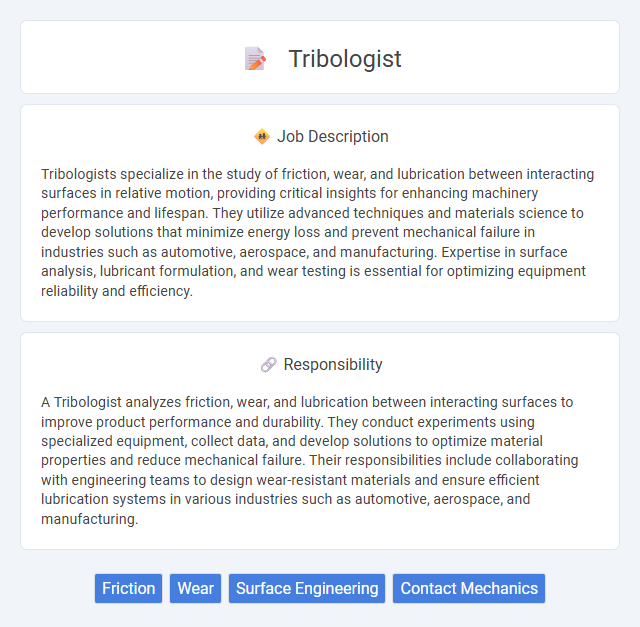
Tribologists specialize in the study of friction, wear, and lubrication between interacting surfaces in relative motion, providing critical insights for enhancing machinery performance and lifespan. They utilize advanced techniques and materials science to develop solutions that minimize energy loss and prevent mechanical failure in industries such as automotive, aerospace, and manufacturing. Expertise in surface analysis, lubricant formulation, and wear testing is essential for optimizing equipment reliability and efficiency.
Individuals with strong analytical skills and a passion for mechanical systems are likely to be well-suited for a tribologist role. Those comfortable working in laboratory or industrial environments, with attention to detail and problem-solving abilities, may find this career fulfilling. People who prefer hands-on technical work and continuous learning in materials science and lubrication stand a higher probability of success in the field.
Qualification
A Tribologist typically requires a degree in mechanical engineering, materials science, or a related field, often coupled with specialized training in friction, wear, and lubrication analysis. Proficiency in analytical techniques such as surface characterization, failure analysis, and machine condition monitoring is essential for effective problem-solving. Advanced roles may demand experience with simulation software and research in tribological materials to improve system performance and durability.
Responsibility
A Tribologist analyzes friction, wear, and lubrication between interacting surfaces to improve product performance and durability. They conduct experiments using specialized equipment, collect data, and develop solutions to optimize material properties and reduce mechanical failure. Their responsibilities include collaborating with engineering teams to design wear-resistant materials and ensure efficient lubrication systems in various industries such as automotive, aerospace, and manufacturing.
Benefit
Working as a tribologist likely offers significant career benefits such as opportunities to innovate in reducing wear and friction in mechanical systems, which can lead to enhanced product lifespan and efficiency. This role may also provide a competitive salary and potential for growth in industries like automotive, aerospace, and manufacturing. Professionals in this field probably gain specialized expertise that is highly valued in engineering and research sectors.
Challenge
A tribologist's job likely involves solving complex problems related to friction, wear, and lubrication in mechanical systems, which can be highly challenging due to the need for deep technical knowledge and innovative approaches. The role probably requires constant adaptation to new materials and technologies to optimize performance and extend equipment lifespan. Managing these variables effectively could be crucial for reducing operational costs and preventing unexpected failures in various industries.
Career Advancement
Career advancement in tribology often involves progressing from entry-level research or laboratory roles to senior positions such as senior tribologist, research scientist, or engineering manager. Gaining expertise in friction, wear, and lubrication mechanics coupled with advanced qualifications, including a master's or PhD in materials science or mechanical engineering, significantly enhances promotion prospects. Continuous professional development through certifications and involvement in industry projects or patents accelerates career growth in tribology.
Key Terms
Friction
A tribologist specializes in studying friction, wear, and lubrication between interacting surfaces to optimize mechanical performance and extend equipment lifespan. This role involves analyzing frictional forces and developing materials or coatings that reduce energy loss and minimize wear in engines, machinery, and manufacturing processes. Expertise in friction behavior is crucial for improving efficiency, safety, and sustainability across automotive, aerospace, and industrial sectors.
Wear
Tribologists specialize in studying wear, friction, and lubrication between interacting surfaces in motion, crucial for enhancing the lifespan of mechanical components. They analyze wear mechanisms such as abrasion, adhesion, and fatigue to develop materials and coatings that minimize degradation in engines, gears, and bearings. Advanced tribological research contributes to improved efficiency and reduced maintenance costs in industries like automotive, aerospace, and manufacturing.
Surface Engineering
A Tribologist in surface engineering specializes in studying friction, wear, and lubrication to improve material performance and durability of mechanical components. They analyze surface interactions and develop coatings or treatments that enhance resistance to abrasion and corrosion in industrial applications. Expertise in nanotribology and advanced surface characterization techniques drives innovation in extending the lifespan of engineered surfaces.
Contact Mechanics
Tribologists specializing in contact mechanics analyze the interactions between surfaces in relative motion to minimize friction, wear, and lubrication issues. They employ advanced techniques such as finite element analysis and surface characterization to optimize material performance and extend the lifespan of mechanical components. Their expertise is critical in industries like automotive, aerospace, and manufacturing, where precise control of contact stresses enhances reliability and efficiency.
 kuljobs.com
kuljobs.com